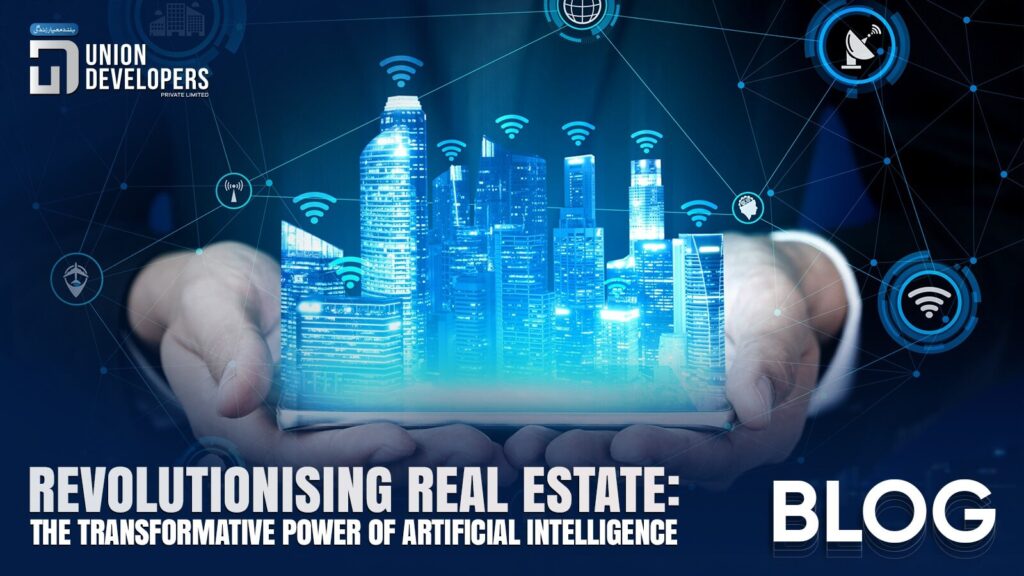Artificial intelligence is successfully gaining popularity in many sectors, and the real estate industry is not far behind. The real estate industry has the potential to thrive more with the integration of artificial intelligence. AI in real estate is now providing new capabilities to redefine the way we sell, invest and buy. The future of real estate relies on artificial intelligence solutions. In this write-up, we will explore how AI is revolutionising the real estate industry and what potential it holds for the future.
Artificial Intelligence In Real Estate Market
AI has paved its way in healthcare, finance and now the real estate industry as well. AI in the real estate industry is transforming the way we handle things. It can provide valuable insights, enhance the client experience, and also automate the real estate processes.
As the market is evolving, those who can sort out large sets of data will have a competitive edge. Also, the developments in technology are transforming business models across various industries. The effect of technology such as artificial intelligence is changing into a more data-driven and immersive approach.

Artificial intelligence and machine learning have the potential to change the real estate industry by making it innovative and productive. As the processes are increasing, clients are looking for more virtual options and more hassle-free solutions.
The real estate industry can predict market trends, get a large amount of data, and improve their home search. They can also make more efficient mortgage lending, boost lead generation, and make real-time market predictions. Pakistan has also taken initiatives to regulate the technology and training for future leaders. The best example is the way Pakistan regulatory authorities digitised the property registration process. Therefore, AI in real estate is revolutionising through its diverse field of application.
Generative AI Market Size and Trends in Real Estate
The global generative AI market size is USD 437.65 million in 2024. It will grow to USD 488.06 million in 2025. The prediction is that it will hit around USD 1,302 million by 2034, expanding at a CAGR of 11.52% between 2024 and 2034. This shows a leading growth in generative AI in the real estate market.
According to trends, property valuation is the dominant segment in generative AI in real estate during the forecast period. Also, the real estate agents segment shares the highest CAGR during the projection period.

Generative AI in the real estate market revolves around artificial intelligence designs and generative models that produce pertinent data or material.
Realistic Photos: Real estate developers can generate realistic photos of properties that are yet to exist.
Virtual tours and property lists: Generative AI solutions are capable of creating virtual tours and property lists better in less time
Architectural Designs: It can help to create floor plans and architectural designs to boost the marketing and efficiency of sales.
Moreover, generative AI can help to benefit real estate by producing virtual staging for void spaces, realistic property images, accurate property valuation and urban planning simulations. These methods have evolved over time and are also boosting the marketing and sales efforts in Pakistan’s real estate market.
How Does Artificial Intelligence Work in Real Estate?
As AI is now making its way into real estate, it enhances traditional practices like property valuation, transaction management and personalised advice for customers. Let’s have a look at how AI integration in real estate works.

Data Analysis
AI helps to collect data from diverse sources such as property listings, sales data, economic indicators, demographic insights and many more. The information then goes through a detailed analysis to find the trends, patterns and predictions.
Property Valuation
AI helps to forecast property values using advanced machine learning algorithms. It identifies the market trends by evaluating factors like amenities, location, market demand, and infrastructure proximity to predict the future growth and worth of the property.
Automation
The routine tasks take a lot of time and AI streamlines all the tasks, like scheduling property viewings, managing admin tasks, and responding to the queries of the clients. Eventually, the real estate market will have to adopt these new technological advancements, and AI is a major part of it.
AI Integration in Smart Homes
Now the focus of the country is on having smart urban environments where smart houses facilitate the community. Smart homes are becoming the new trend to become the next big step in the real estate sector. AI is a major player in their real estate development, such as managing the temperature, controlling lighting and managing the security systems. Property that leverages the AI home systems is more attractive to the clients. Additionally, IoT is a network of physical devices connected to the surface internet that can collect and share the required data. IoT in smart cities can help reduce the pollution and congestion in cities.
Artificial Intelligence and Real Estate in Pakistan
Pakistan is also stepping ahead in the application of technology in the country. The Digital Pakistan Policy is to provide a digital ecosystem on the ground to improve infrastructure, increase digital skills investments, enhance connectivity, and many more.
Under the Digital Policy of Pakistan 2018 and the Pakistan Vision 2025, the ICT industry size is targeted to reach US$ 16.51 billion by 2028. There is a trend for the ProTech in Pakistan that will bring success to the companies. A large consumer base and not many international players make it an excellent place for investments. It is apparent to see that the success of PropTech 3.0 is booming the market in Pakistan. Therefore, modern technology, including AI, will pave its way in Pakistan further.
Lastly,
The new advancement in technology has emerged in the real estate industry as well. AI in the real estate industry is now gaining a lot of attention. Just like when AI solutions digitised hospitals, clinics, and dental clinics, it is also transforming the real estate industry. AI is here to help real estate developers maximise their sales and enhance their clients’ experience. In the future, real estate developers and clients will get accustomed to AI as if it were always used for their tasks.








